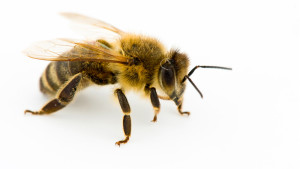For most people, bees are an annoyance. They buzz around, crawl inside soda cans, and sometimes sting. If you’re unlucky enough to be allergic, bees can even be a lethal threat. The simple fact is, if bees didn’t exist, neither would humans, and so, it’s extremely terrifying that honeybees have been dying at an alarming rate over the past few decades. As of this year, the honeybee population in the United States is less than half of what it was in the 1940s. This past winter, 23.2 percent of America’s managed honeybee colonies were lost. The figures were worse during the year prior, but bees are still dying at a disturbing rate, and something needs to change. The US government has stated that bees are now dying at an economically unsustainable rate. In fact, in the United States alone, bees contribute to $15 billion in crop value. Without them, agriculture as we know it would collapse.
Bees and Agriculture
Even if you hate bees, we need them. They are responsible for much of the food on our plates. Bees perform a task that is vital to the survival of agriculture: pollination. In fact, one third of our global food supply is pollinated by bees. Simply, bees keep plants and crops alive. Without bees, humans wouldn’t have very much to eat. To put this into context, here is a list of crops pollinated by bees: Almonds, apples, apricots, avocados, blueberries, cantaloupes, cashews, coffee, cranberries, cucumbers, eggplants, grapes, kiwis, mangoes, okra, peaches, pears, peppers, strawberries, tangerines, walnuts and watermelons. Without bees, these crops would cease to exist. Bees are crucial to our existence, thus we must work harder to protect and preserve them.
Why are bees dying?
There is an ongoing debate surrounding the disappearance of bees. It seems pretty clear that pesticides are the main culprit, however. Since the end of World War II, the use of pesticides in agriculture has increased dramatically. Relatedly, it is now suggested that the widespread use of pesticides known as neonicotinoids is having a terrible impact on the health of bees.
Neonicotinoids, which are chemically similar to nicotine, are an extremely popular pesticide. They are likely poisoning bees and other pollinators. In essence, pesticides are terrible for the environment, and they are killing the organisms that help the world, and humans, survive.
Bees are dying from a combination of factors, but primarily due to the impact of human practices and the ongoing problems associated with climate change. Pesticides, environmental degradation and pollution, are all contributing to the alarming rate of bee deaths. The irony of this is, by killing bees, we are hurting ourselves. Our survival depends on the health of the planet and its species, and unless we begin to realize this then we will continue to contribute to its extinction— and our own.
What can we do?
Luckily, there are already efforts to save bees and other pollinators. In fact, in June 2014, President Obama established a Pollinator Health Task Force. This is a federal effort to help stop the deaths of bees as well as simply having a garden can greatly assist the health and livelihood of bee populations, plant flowers in your yard and neighborhood, don’t contaminate them with pesticides and you will help save bees. The more flowers there are, the better chance bees have of receiving the nutrition they need to survive. Having more bees means good things for the planet, and for us.It’s also important that we plant a diverse array of flowers in a multiplicity of locations. We need flowers in urban and rural environments. This will help ensure the health of bees and our crops. This is not our world alone, we share it with a massive variety of species. There is no better time than now to begin reversing the detrimental impact humans have had on the environment. The first step is educating people on the problem, and how they can contribute to a solution. This is a task that will require the help of all of the world’s 7.1 billion humans. When it comes to the survival of the planet, we cannot afford to be ignorant or indifferent.

